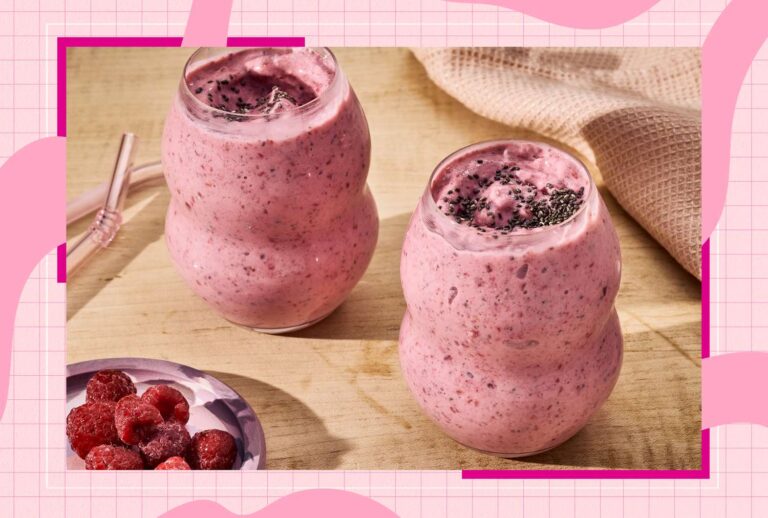Magnesium doesn’t receive as much airtime as other nutrients (like protein), yet it’s so important for maintaining our whole-body health. The mineral helps with heart and nerve function, blood pressure, blood sugar regulation, strong bones and energy production. “Magnesium is a mineral your body needs to help over 300 little ‘helper’ proteins (called enzymes) do their jobs,” says Vanessa Imus, RDN.
When magnesium levels are low, your first symptoms may include muscle cramps, fatigue or poor sleep, says Imus. If you’re not eating enough magnesium-rich foods, such as leafy greens, nuts, seeds and whole grains, you’re probably low in this mineral. Let’s zero in on seeds as a source of magnesium: Dietitians say chia seeds, specifically, are a simple, underrated way to add more magnesium to your day. Here’s what you need to know about including more chia seeds in your diet.
The Benefits of Chia Seeds
They’re a Source of Important Nutrients
One ounce (about 2 tablespoons) of chia seeds offers 95 milligrams of magnesium, which provides 23% of your Daily Value. That same 1-ounce serving has 10 grams of fiber (!), 5 grams of the omega-3 alpha-linolenic acid and 5 grams of protein. Chia seeds also offer B vitamins and are a source of a number of antioxidants, including chlorogenic acid, caffeic acid, kaempferol and quercetin.
They May Help with Digestion
Chia seeds provide magnesium and fiber, both of which are essential for maintaining a healthy digestive system. For starters, magnesium may help promote the growth of beneficial bacteria in the gut. These bacteria work to improve the gut barrier’s function and balance the microbiome, Imus says. Not only that, but magnesium may also help regulate bowel movements. Two tablespoons of chia seeds pack an impressive 35% of your fiber needs. Eating more fiber helps with digestion regularity so that you’re going to the bathroom consistently (and easily)—just make sure to drink plenty of water.
They Support a Healthy Heart
The ample amount of magnesium, fiber and omega-3 fats found in chia seeds also supports a healthy heart. Chia seeds may reduce the risk of cardiovascular disease by lowering triglyceride and LDL cholesterol levels, while also raising HDL cholesterol. They may also help lower blood pressure.
Chia seeds, especially ground chia seeds, can increase levels of omega-3 fatty acids in the blood, which can help fight heart disease. In turn, low magnesium levels have been linked to issues like high blood pressure and irregular heartbeat.
They Might Help You Sleep Better
If you’re not sleeping well, it could be a sign your body needs more magnesium, says Ali McGowan, M.S., RD, LDN: “Chia seeds are a small, easy step to help fill that gap.” Observational studies have found that low magnesium intake may be linked to sleep problems like snoring, short sleep duration and daytime sleepiness.
Plus, emerging research has found that omega-3 fatty acids may also improve how well you sleep. A clinical trial found that EPA and DHA improved sleep quantity and quality compared to a placebo.
How to Enjoy Chia Seeds
Chia seeds have a slight earthy taste, but otherwise, they don’t have much flavor. This means chia seeds can easily be added to many dishes and recipes to add thickness while also boosting the nutritional offerings. “I love adding chia seeds to overnight oats, blending them into smoothies for extra thickness, or making a quick pudding with milk, cinnamon and vanilla,” says McGowan.
Add to oats: Add fun texture and thickness to your overnight oats recipe. You can add chia seeds ground or whole, just make sure to add more liquid for the seeds to soak up, or else your breakfast may be dry. The fiber and protein combo from chia seeds will give you more staying power (i.e., you’ll feel fuller longer) throughout the morning. Try our Overnight Oats with Chia Seeds.
Make chia pudding: Chia pudding couldn’t be easier to pull together. Just combine chia seeds with your choice of liquid (milk and plant-based milks work well) and voilà, chia pudding. Adding flavors like vanilla, ground cinnamon, honey or maple syrup will take your pudding up a notch. Or try our go-to Chia Seed Pudding recipe.
Create your own jam: Store-bought jam can be high in added sugar and low in nutrients, so consider making your own with chia seeds. It’s as simple as combining a fruit of your choice—frozen berries work well—with chia seeds. Try our Peanut Butter & Chia Berry Jam English Muffin recipe to start.
Imus also reminds us not to overdo it. “Chia seeds absorb a lot of water, and too much may lead to constipation or bloating.” Starting with 1 to 2 tablespoons is a reasonable amount.
Our Expert Take
Chia seeds make for a great way to up your intake of magnesium. Two tablespoons of chia seeds provide about a quarter of our daily needs, which helps support a healthy heart, better sleep and good digestion. Try adding the seeds to overnight oats, smoothies, yogurt or toast for a boost in not only magnesium, but also omega-3 fatty acids, fiber and protein.


